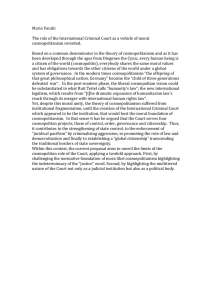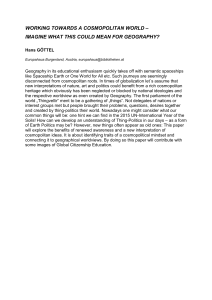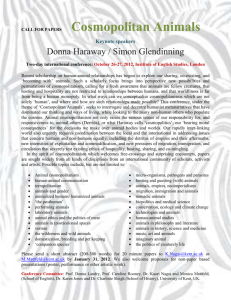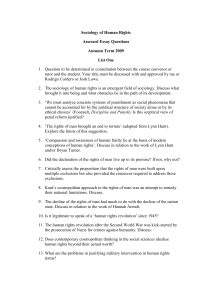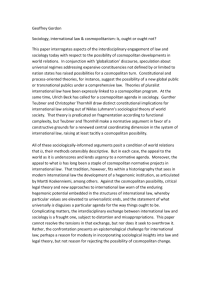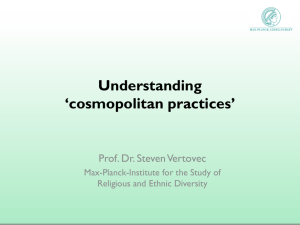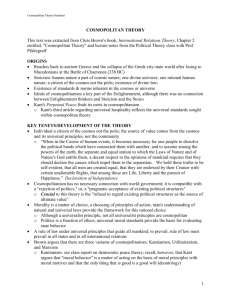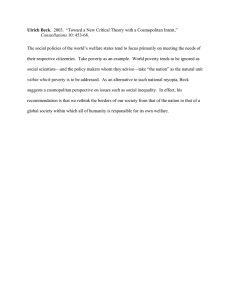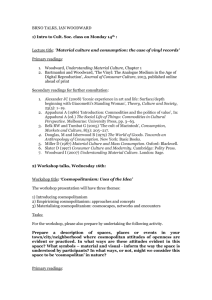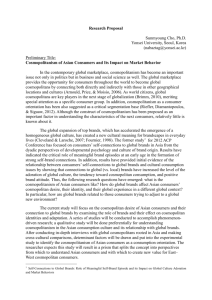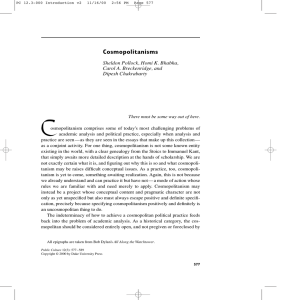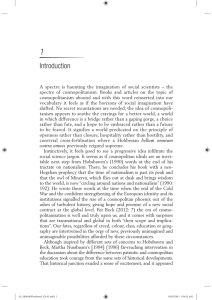Research Symposium: Postcolonial Cosmopolitanisms Tuesday 24 May, 2011
advertisement
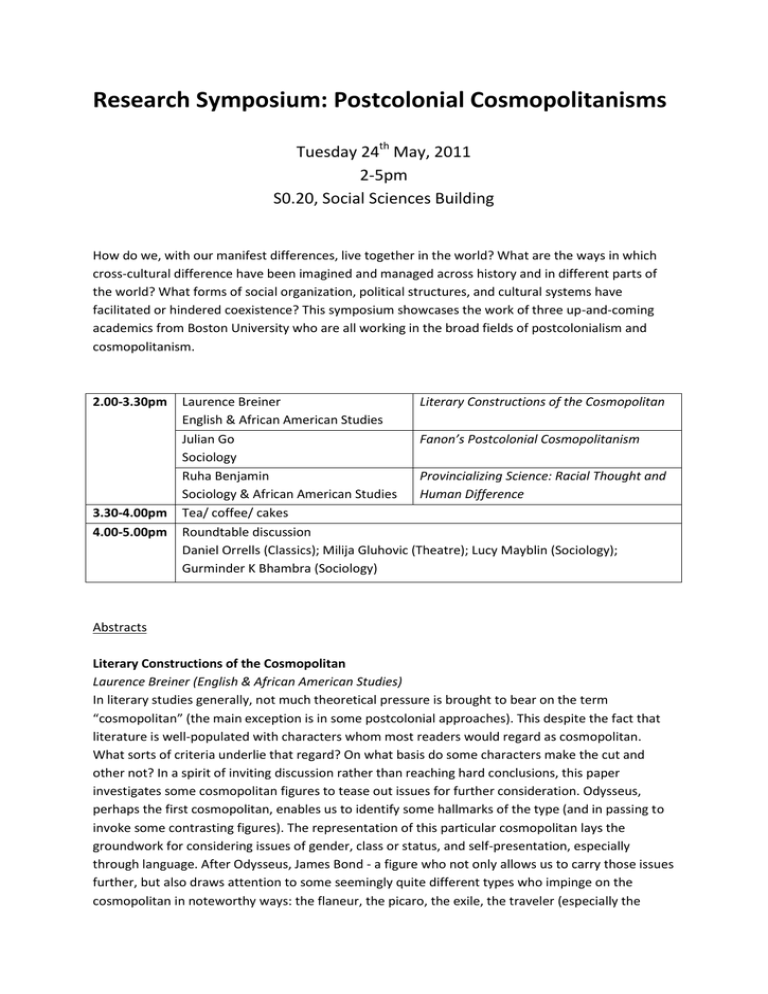
Research Symposium: Postcolonial Cosmopolitanisms Tuesday 24th May, 2011 2-5pm S0.20, Social Sciences Building How do we, with our manifest differences, live together in the world? What are the ways in which cross-cultural difference have been imagined and managed across history and in different parts of the world? What forms of social organization, political structures, and cultural systems have facilitated or hindered coexistence? This symposium showcases the work of three up-and-coming academics from Boston University who are all working in the broad fields of postcolonialism and cosmopolitanism. 2.00-3.30pm 3.30-4.00pm 4.00-5.00pm Laurence Breiner Literary Constructions of the Cosmopolitan English & African American Studies Julian Go Fanon’s Postcolonial Cosmopolitanism Sociology Ruha Benjamin Provincializing Science: Racial Thought and Sociology & African American Studies Human Difference Tea/ coffee/ cakes Roundtable discussion Daniel Orrells (Classics); Milija Gluhovic (Theatre); Lucy Mayblin (Sociology); Gurminder K Bhambra (Sociology) Abstracts Literary Constructions of the Cosmopolitan Laurence Breiner (English & African American Studies) In literary studies generally, not much theoretical pressure is brought to bear on the term “cosmopolitan” (the main exception is in some postcolonial approaches). This despite the fact that literature is well-populated with characters whom most readers would regard as cosmopolitan. What sorts of criteria underlie that regard? On what basis do some characters make the cut and other not? In a spirit of inviting discussion rather than reaching hard conclusions, this paper investigates some cosmopolitan figures to tease out issues for further consideration. Odysseus, perhaps the first cosmopolitan, enables us to identify some hallmarks of the type (and in passing to invoke some contrasting figures). The representation of this particular cosmopolitan lays the groundwork for considering issues of gender, class or status, and self-presentation, especially through language. After Odysseus, James Bond - a figure who not only allows us to carry those issues further, but also draws attention to some seemingly quite different types who impinge on the cosmopolitan in noteworthy ways: the flaneur, the picaro, the exile, the traveler (especially the traveler who writes or tells tales) , and the expat. Both Ulysses and Bond are amenable to (post)colonial situations, and the paper concludes by turning to the particular case of the Caribbean, where both of them are familiar figures, and where the cosmopolitan takes on some distinctive forms, as some attention to Derek Walcott’s work makes apparent. Fanon’s Postcolonial Cosmopolitanism Julian Go (Sociology) In the social sciences, cosmopolitanism has emerged as a powerful new paradigm for describing our current phase of modernity. As a method that seeks a transcendence of methodological nationalism, and as sociopolitical orientation espousing global citizenship, humanistic values and an openness to difference, it has been traced back to the thinking of Kant and, according to some, reappears most forcefully today amidst globalization. But cosmopolitan theory has rightly been criticized for its Eurocentrism, its Western genealogy, its focus upon European experiences, and its Western standpoint. Simply put, cosmopolitanism has not been cosmopolitan enough. This essay joins these critiques and offers a preliminary reading of the work of Frantz Fanon to interrogate cosmopolitanism’s Western self-understanding. Through Fanon we are able to see how current cosmopolitanism is not just enabled by Western thinkers and globalization but also has a genealogy that can be traced to colonialism and its contradictions. Matching Bhambra’s recent critique of cosmopolitan theory, Fanon offers a postcolonial cosmopolitanism – a new humanism that is open to universalism and difference but also remembers the violence attendant with those ideals. Provincializing Science: Racial Thought and Human Difference Ruha Benjamin (Sociology & African American Studies) This talk examines human difference through the prism of the life sciences which have for so long mutually constituted social taxonomies, cultural hegemony, state power, and empire building. In seeming contrast, the recent mapping of the human genome prescribed an end to centuries old chauvinisms by attesting that we are, in fact, one human race. Almost as soon as this was announced, researchers began a quest to identify ethnoracial patterns in the small fraction of our genome that differs. The quest to discover such patterns re-naturalizes old ethnoracial groupings but it also ignites novel sovereignties that are pushing back against the imperial creep of Euro-American research & development. Genomic sovereignty policies assert a protective ownership over the DNA of entire populations in response to the pharmaceutical industry’s increasing focus on geneticallytailoring drugs to niche ethnic markets. In examining this new territorialization of human difference, we are led to ask how postcolonialism and cosmopolitanism can help us make sense of these competing forms of life—code that requires sequencing, property which needs protection, capital that warrants investment, and constituencies who demand entitlements—all of which are produced in these biopolitical experiments to different effect. We might also ask, what visions of (the good) life are excluded or sterilized as perceived contaminants to the experiment? And whether postcolonial or cosmopolitan sociologies can help us imagine and invent alternative forms of knowledge production and benefit-sharing?
